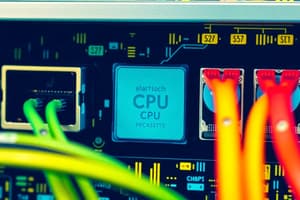Podcast
Questions and Answers
What could be a potential consequence of a CPU running above 70°C (158°F)?
What could be a potential consequence of a CPU running above 70°C (158°F)?
- Overheating and causing performance issues (correct)
- Improving system performance
- Reducing the risk of malware infections
- Increasing RAM efficiency
How can updating drivers help with CPU-related performance issues?
How can updating drivers help with CPU-related performance issues?
- Improving hardware-software compatibility (correct)
- Optimizing CPU cooling
- Increasing the number of background applications
- Decreasing system speed
What is a cost-effective solution to enhance performance if your computer is from 2011 or earlier?
What is a cost-effective solution to enhance performance if your computer is from 2011 or earlier?
- Installing more resource-intensive applications
- Increasing RAM capacity (correct)
- Reducing system airflow
- Upgrading the CPU
How can running a full system scan with antivirus software help with CPU issues?
How can running a full system scan with antivirus software help with CPU issues?
What can multiple resource-hungry background applications cause on a computer?
What can multiple resource-hungry background applications cause on a computer?
If a computer has insufficient RAM, what issue can result from constant swapping between main memory and hard disk space?
If a computer has insufficient RAM, what issue can result from constant swapping between main memory and hard disk space?
What is one of the most critical components affecting computer performance?
What is one of the most critical components affecting computer performance?
Which component of the computer processes instructions from memory and input devices?
Which component of the computer processes instructions from memory and input devices?
What can happen if a computer's CPU overheats?
What can happen if a computer's CPU overheats?
How can you address performance issues caused by outdated drivers?
How can you address performance issues caused by outdated drivers?
What feature of modern CPUs allows them to handle more complex calculations simultaneously?
What feature of modern CPUs allows them to handle more complex calculations simultaneously?
Why might a single application cause delays even on a CPU with multiple cores?
Why might a single application cause delays even on a CPU with multiple cores?
Study Notes
Computer Performance and CPU Issues
A computer's overall performance is influenced by various factors, including hardware and software configurations. One of the most critical components affecting computer performance is the Central Processing Unit (CPU). If your computer experiences frequent freezing, crashes, and sluggish responses when running applications, it could indicate significant problems related to the CPU. In this article, we will discuss some common issues related to computer performance and their potential solutions.
Understanding CPU Performance
The CPU plays a crucial role in determining how quickly tasks can be completed. It processes instructions from other parts of the computer, such as memory and input devices, and transforms them into meaningful actions. Modern CPUs have multiple cores, which allow them to handle more complex calculations simultaneously. However, even with multiple cores, there may be times when a single application requires too much processing power, causing delays.
Common CPU Issues
Some common CPU issues that can negatively impact computer performance include:
-
Overheating: High temperatures can cause physical damage to the CPU and reduce its lifespan. Regularly cleaning dust away from fans and ensuring proper airflow can help keep your PC cool.
-
Outdated Drivers: Using outdated drivers can lead to poor compatibility between hardware and software, causing performance issues. Updating all drivers can resolve these problems.
-
Malware: Malicious software can consume system resources, leading to slow speeds and lagging performance. Installing and regularly updating antivirus programs can protect against malware.
-
Insufficient RAM: Too little RAM can result in constant swapping between main memory and hard disk space, which significantly slows down performance. Increasing the amount of installed RAM can alleviate this issue.
-
Resource-intensive Applications: Running several resource-hungry background applications can cause performance bottlenecks. Closing unnecessary applications can improve overall system performance.
Diagnosis and Solutions
If you suspect that your CPU is the root cause of your computer's performance issues, follow these steps to diagnose and resolve the problem:
-
Check the temperature: Use a monitoring program to monitor the temperature of your CPU. If it consistently runs above 70°C (158°F), it may be overheating. Clean out dust, ensure proper airflow, or replace the cooling system if necessary.
-
Update drivers: Use the Device Manager on Windows or the System Preferences on Mac to check for updates on all installed drivers. This can help improve compatibility between hardware and software.
-
Scan for malware: Run a full system scan with your antivirus software to detect and remove any malicious programs.
-
Add more RAM: Upgrading your RAM is a cost-effective way to significantly improve performance. If you're using a computer from 2011 or earlier, it could benefit from the additional memory.
-
Manage applications: Monitor your application usage and close any unnecessary background programs. You can also use a program like Task Manager to see which apps are using the most system resources.
Remember, a sluggish computer doesn't necessarily mean you need to replace the CPU. By identifying and addressing these common issues, you can often restore your computer's performance to acceptable levels.
Studying That Suits You
Use AI to generate personalized quizzes and flashcards to suit your learning preferences.
Description
Explore the factors affecting computer performance, with a focus on Central Processing Unit (CPU) issues such as overheating, outdated drivers, malware, insufficient RAM, and resource-intensive applications. Learn how to diagnose and address common CPU-related performance problems to improve your computer's speed and responsiveness.




